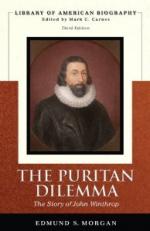
|
| Name: _________________________ | Period: ___________________ |
This test consists of 15 multiple choice questions and 5 short answer questions.
Multiple Choice Questions
1. Which of John Winthrop’s sons settled in Ipswich?
(a) William Winthrop
(b) Henry Winthrop
(c) Paul Winthrop
(d) John Winthrop, Jr
2. Roger Williams first arrived in the New World aboard what ship?
(a) The Arbella
(b) The St. Mary
(c) The Holy Royal
(d) The Lyon
3. In the spring of 1637, the author describes the Massachusetts Bay Colony’s involvement in a war with an Indian tribe. Where were the settlers that “bore the brunt of the fighting”?
(a) Connecticut
(b) Maine
(c) Virginia
(d) New Hampshire
4. When did William and Anne Hutchinson first arrive in Boston?
(a) September 18, 1634
(b) July 28, 1629
(c) February 2, 1626
(d) May 15, 1629
5. How many pounds did the General Court usually pay John Winthrop per year while he was governor?
(a) 25
(b) 100
(c) 200
(d) 50
6. What was the name of Anne Hutchinson’s brother-in-law that was a minister whom she admired?
(a) Reverend George Phillips
(b) Reverend John Humfrey
(c) Reverend John Wheelwright
(d) Reverend John Preston
7. After Winthrop moved the colony headquarters to Charlestown, he summoned the assistants for their first meeting on what date?
(a) May 15, 1629
(b) October 19, 1630
(c) August 23, 1630
(d) February 2, 1626
8. When Roger Williams was first offered a position as minister at the Salem church, John Winthrop wrote to whom, marveling that they would choose a teacher with such dangerous views?
(a) Sir Richard Saltonstall
(b) John Endecott
(c) Roger Ludlow
(d) Reverend John Wheelwright
9. How many Englishmen were said to have come to the Massachusetts Bay Colony in the summer of 1638?
(a) 500
(b) 1,000
(c) 3,000
(d) 5,000
10. What term from Chapter 10: “Seventeenth-Century Nihilism” refers to one who holds that under the gospel, dispensation of grace is of no use or obligation because faith alone is necessary to salvation”?
(a) An antinomian
(b) A conversionist
(c) An anarchist
(d) A Presbyterian
11. What individual, who was later to be honored as Cromwell’s chaplain, urged that John Cotton be commissioned to “go through the Bible, and raise marginal notes upon all the knotty places of the scriptures,” according to the author in Chapter 10: “Seventeenth-Century Nihilism”?
(a) Isaac Johnson
(b) William Blackstone
(c) Hugh Peter
(d) John Humfrey
12. Richard Bellingham is said to have been a lawyer in England and a member of Charles I’s Parliament of what year?
(a) 1628
(b) 1631
(c) 1632
(d) 1629
13. What term from the book refers to a political leader in a democracy who appeals to the emotions, prejudices, and ignorance of the less-educated citizens in order to gain power and promote political motives?
(a) Synod
(b) Fascist
(c) Demagogue
(d) Despotism
14. The author describes Anne Hutchinson’s beliefs by saying in Chapter 10: “Seventeenth-Century Nihilism” that, “In Puritan terminology this meant that "sanctification" was no evidence of” what?
(a) Classification
(b) Edification
(c) Justification
(d) Redemption
15. In the spring of 1637, the Massachusetts Bay Colony became involved in a war with what Indian tribe?
(a) The Cherokee Indians
(b) The Pequot Indians
(c) The Narragansett Indians
(d) The Mohegan Indians
Short Answer Questions
1. Who was elected governor of the Massachusetts Bay Colony in 1635?
2. Tenhills Farm was located in what current city, according to the author in Chapter 12: “New England or Old”?
3. On what date did John Winthrop summon at Charlestown the first meeting labeled in the records as a General Court?
4. What word from Chapter 11: “The New England Way” refers to an officer appointed as deputy by and to a sovereign or supreme chief?
5. Where was Anne Hutchinson born?
|
This section contains 532 words (approx. 2 pages at 300 words per page) |

|




